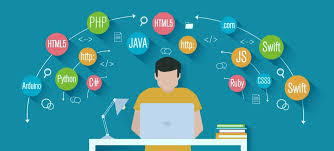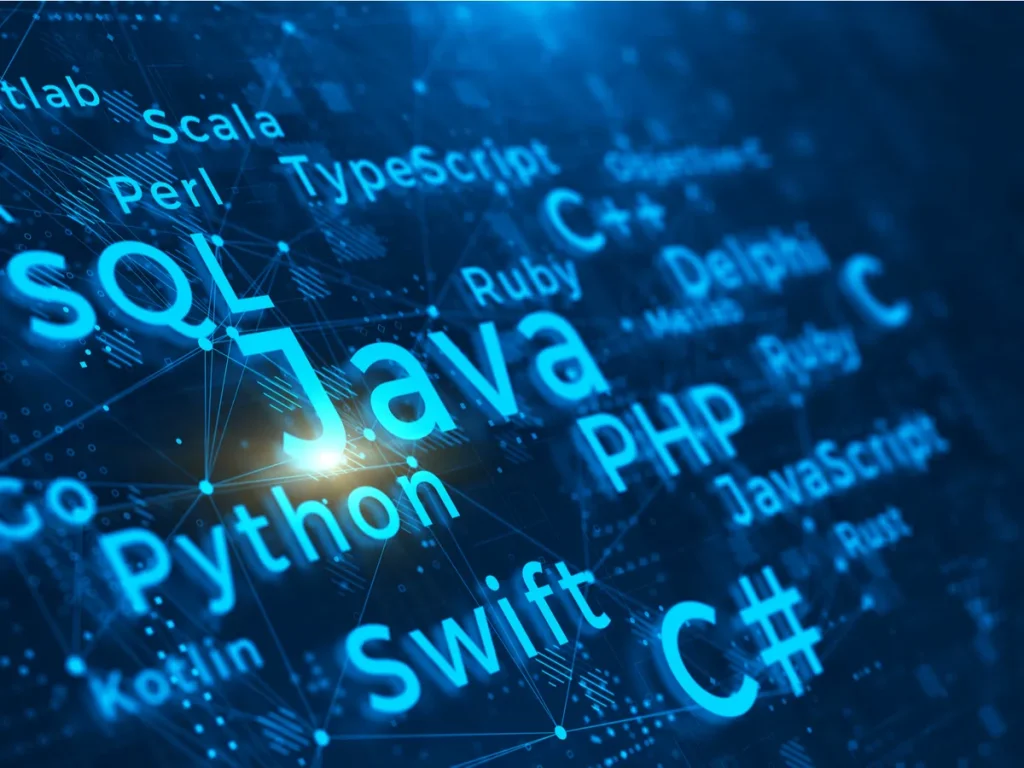eCommerce AI | Web Apps | AR/VR Software – ECA Tech
- Home
- Programming Languages: 8 Best Things to Know before Choosing One
Programming Languages: 8 Best Things to Know before Choosing One

October 9, 2024 - Technology
Choosing the right programming language is a crucial decision for anyone embarking on a software development journey. Whether you’re a beginner looking to get started with coding or an experienced developer aiming to expand your skill set, understanding the landscape of programming languages is essential. With hundreds of programming languages available, each suited to different tasks, industries, and platforms, making an informed choice can save you time, effort, and frustration.
In this blog post, we will delve into the eight best things you should know before choosing a programming language. By understanding the factors that influence this choice, you’ll be better equipped to select the right language for your goals, project requirements, and career aspirations.
- Purpose
- Goals
- Time
- Effort
1. Understand the Purpose of the Language
The first thing to consider when choosing a programming language is its purpose. Each programming language is designed with specific goals and use cases in mind. Some languages are general-purpose, while others are specialized for particular domains or tasks.
- General-purpose languages like Python, Java, and C++ are versatile and can be used for a wide variety of applications, including web development, desktop applications, data analysis, and more.
- Domain-specific languages (DSLs) such as SQL (for databases), R (for statistical computing), and MATLAB (for mathematical modeling) are designed for particular types of tasks.
It’s essential to understand what you want to achieve with the language. For example:
- If you’re interested in web development, languages like JavaScript, HTML/CSS (front-end), or PHP and Ruby (back-end) may be ideal.
- For data science and machine learning, Python and R are popular choices due to their rich ecosystems of libraries and frameworks.
- If you’re looking to develop mobile apps, Swift (for iOS) and Kotlin (for Android) are tailored for this purpose.
Knowing the purpose of the language will help you focus on languages that align with your goals and avoid investing time in learning something that won’t be useful for your specific needs.
2. Consider Your Learning Curve and Experience Level
Another critical factor in choosing a programming language is the learning curve. Some languages are known for their simplicity and are great for beginners, while others may have more complex syntax and require a deeper understanding of programming concepts.
- Easy-to-learn languages: Python is widely regarded as one of the most beginner-friendly languages due to its simple, readable syntax. It abstracts many complex details and allows new programmers to focus on learning programming concepts without getting bogged down by technicalities.
- Moderate-to-difficult languages: Languages like C++, Java, and Rust have a steeper learning curve because they require more understanding of memory management, object-oriented principles, and system-level programming.
If you’re a beginner, it’s generally advisable to start with a language like Python, Ruby, or JavaScript to grasp fundamental concepts before moving on to more complex languages.
However, if you already have experience in programming and are looking to expand your skills, you may prefer a language that challenges you and offers more control over low-level operations, such as C++ or Rust. Experienced developers often enjoy learning languages like Go or Scala, which may have unique paradigms or performance advantages.
3. Examine the Ecosystem and Libraries
The ecosystem around a programming language is another crucial factor to consider. A language’s ecosystem includes its libraries, frameworks, tools, and community support, all of which can significantly affect your productivity.
- Libraries: A rich set of libraries means that you can avoid reinventing the wheel for common tasks. For example, Python has an extensive range of libraries for web development (Flask, Django), data science (NumPy, Pandas), and machine learning (TensorFlow, PyTorch).
- Frameworks: Many programming languages are supported by robust frameworks that simplify the development process. JavaScript, for example, is supported by frameworks like React, Angular, and Vue.js for front-end development, while Node.js is used for server-side applications.
- Tools: Development tools, such as IDEs (Integrated Development Environments), debuggers, and build tools, are critical for writing, testing, and deploying code. Languages with rich toolsets (like Java and C#) often provide a smoother development experience.
When evaluating a programming language, consider whether it has the libraries and frameworks needed to support the types of projects you’re working on. Also, think about whether the language has an active developer community that contributes to and maintains these tools.
For example:
- JavaScript has a massive ecosystem of tools, libraries, and frameworks, making it the dominant language for web development.
- Python has libraries like Pandas, SciPy, and TensorFlow, which make it indispensable in fields like data science, artificial intelligence (AI), and machine learning.
A language with an active community and robust library support can save you time and effort, and help you avoid common pitfalls during development.
4. Check Performance and Scalability
Performance is another crucial consideration when choosing a programming language, especially if you are developing applications that require high speed, low latency, or resource efficiency. Scalability is equally important for projects that you expect to grow in size and complexity.
- High-performance languages: C and C++ are known for their performance and efficiency because they provide control over memory management and hardware-level operations. These languages are often used in systems programming, game development, and high-performance applications like video processing and real-time simulation.
- Interpreted languages: Languages like Python and Ruby are interpreted rather than compiled, which makes them slower in terms of raw performance compared to compiled languages like C++ or Rust. However, these languages are often used for applications where ease of development and fast iteration cycles are more important than performance.
- Scalability: Languages like Java, Go, and Node.js are designed for scalability. Java’s JVM (Java Virtual Machine) allows applications to scale efficiently across large systems, while Go’s lightweight concurrency model is optimized for cloud-native applications and distributed systems.
If you’re developing a small web application or a personal project, performance may not be a major concern. However, if you’re working on a large-scale enterprise system, real-time application, or cloud-based service, performance and scalability become much more critical.
5. Understand the Paradigms and Styles
Programming languages follow different paradigms, or styles of programming, which dictate how you write and structure code. Some languages support multiple paradigms, while others are more specialized. Understanding these paradigms can help you choose a language that fits your preferred way of thinking or the project’s requirements.
- Object-oriented programming (OOP): Languages like Java, C++, and Python support object-oriented programming, which models data as objects and defines relationships between them. OOP is commonly used for large-scale applications and is known for promoting code reuse and modularity.
- Functional programming: Languages like Haskell, Scala, and F# emphasize functions, immutability, and stateless operations. Functional programming is ideal for applications where you want to avoid side effects and improve code predictability. Python and JavaScript also support functional programming features like first-class functions and higher-order functions.
- Procedural programming: C and Pascal are examples of languages that follow the procedural paradigm, where the focus is on writing sequences of instructions or procedures. This paradigm is often used for system-level programming and embedded systems.
- Concurrent programming: Go and Erlang are designed with concurrency in mind, making them ideal for applications that need to handle multiple processes or threads efficiently. These languages are popular in cloud computing and distributed systems.
Consider whether a particular programming paradigm fits the type of work you want to do. Some developers prefer the modular structure of OOP, while others enjoy the purity and predictability of functional programming.
6. Job Market and Career Opportunities
If you’re learning a programming language to enhance your career prospects, it’s important to consider the demand for that language in the job market. Some languages are more widely used across industries and offer more job opportunities than others.
- Popular languages: JavaScript, Python, and Java consistently rank among the most popular languages in the job market due to their wide range of applications. JavaScript is essential for web development, Python is in high demand for data science and AI roles, and Java is used extensively in enterprise-level software development.
- Niche languages: Some languages are in high demand in specialized industries. For example, R and Julia are popular in data science and scientific computing, while Solidity is used for blockchain development. These languages may offer lucrative job opportunities in their respective fields, but they may not be as widely applicable outside of those niches.
Consider researching job boards, industry reports, and salary surveys to determine which languages are in demand in your desired field. While learning a niche language can open doors to specialized roles, mastering a widely-used language may offer more flexibility and job security.
7. Community Support and Documentation
The size and activity of a programming language’s community can have a significant impact on your learning experience and problem-solving capabilities. A large, active community means more resources, tutorials, forums, and documentation are available to help you when you encounter challenges.
- Popular languages with strong communities: Python, JavaScript, and Java have large, active developer communities. This means you’ll find abundant resources, from beginner-friendly tutorials to advanced guides. Stack Overflow and GitHub have extensive repositories of code, solutions, and discussions related to these languages.
- Smaller communities: Less popular languages may have smaller communities, which can make it harder to find support when you encounter problems. While this may be less of an issue for experienced developers, beginners may struggle without ample resources and documentation.
When choosing a programming language, it’s a good idea to check whether it has strong community support, active forums, and up-to-date documentation. If a language is well-supported, it will be easier to find answers to your questions, contribute to open-source projects, and collaborate with other developers.
8. Long-term Viability and Trends
Technology evolves rapidly, and programming languages can rise and fall in popularity over time. Some languages have been around for decades and are likely to remain relevant for the foreseeable future, while others may be at risk of becoming obsolete.
- Established languages: Languages like C, Java, and Python have stood the test of time and continue to be widely used in industry. These languages are well-supported and have extensive ecosystems, making them safe bets for long-term viability.
- Emerging languages: Languages like Rust, Go, and Kotlin are gaining popularity due to their modern features, performance, and scalability. These languages are well-positioned for the future, especially in areas like systems programming, cloud computing, and mobile development.
- Declining languages: Some languages, such as Perl and COBOL, have seen a decline in popularity over the years. While they may still be used in specific industries (e.g., COBOL in legacy financial systems), they may not be the best choice for new projects or developers looking to future-proof their skills.
It’s important to keep an eye on industry trends and consider the long-term viability of a programming language. While learning a cutting-edge language can be exciting, it’s worth ensuring that the language has a growing user base and is likely to remain relevant in the future.

shaping your career.
Choosing the right programming language is a critical decision that can shape your career, influence your project’s success, and define the kind of work you do. By understanding the purpose of the language, considering your experience level, examining the ecosystem and libraries, checking performance, and weighing career opportunities, you’ll be better equipped to make an informed choice.
No single programming language is perfect for all tasks, and often, the best approach is to learn multiple languages over time to broaden your skill set. However, by keeping these eight factors in mind, you can choose the right language for your current goals and set yourself up for success in the ever-evolving world of software development.
By clicking Learn More, you’re confirming that you agree with our Terms and Conditions.

programming languages FAQ
1. What is a programming language?
A programming language is a formal language used to communicate instructions to a computer. It serves as a bridge between humans and machines, enabling us to create software, applications, and websites. Programming languages consist of a set of rules, syntax, and semantics that define how instructions are written and interpreted by the computer. There are numerous programming languages available, each with its own strengths, weaknesses, and specific use cases.
2. Why are there so many different programming languages?
The diversity of programming languages can be attributed to several factors:
- Specific Use Cases: Different languages are designed to excel in particular domains, such as web development, data science, mobile app development, or system programming.
- Historical Context: Some languages have a long history and have evolved over time to meet changing needs.
- Paradigms: Programming languages can follow different paradigms, such as object-oriented, functional, or procedural, which influence their structure and approach to problem-solving.
- Performance: Certain languages are optimized for speed and efficiency, while others prioritize readability and ease of use.
- Ecosystem: The availability of libraries, frameworks, and tools can also influence the popularity and adoption of a programming language.
3. How do I choose the right programming language for my project?
Selecting the appropriate programming language for a project depends on several factors:
- Project Requirements: Consider the specific functionalities, performance needs, and target platforms of your project.
- Team Expertise: Evaluate the skills and experience of your team members and their familiarity with different programming languages.
- Community and Ecosystem: Research the size and activity of the language’s community, as well as the availability of libraries, frameworks, and resources.
- Learning Curve: Assess the complexity and difficulty of learning the language, especially if you are new to programming.
- Future Outlook: Consider the language’s long-term viability and its potential for future development and support.
4. Can I learn multiple programming languages at once?
While it’s possible to learn multiple programming languages simultaneously, it’s generally recommended to focus on one language at a time to build a strong foundation before moving on to others. Mastering a single programming language will provide you with a solid understanding of programming concepts and problem-solving techniques, which can be applied to other languages.
5. Is there a "best" programming language?
There is no single “best” programming language that is universally superior to all others. The ideal language depends on the specific context and requirements of your project. Some popular and versatile programming languages include Python, JavaScript, Java, C++, and C#.
6. How do I stay up-to-date with the latest trends in programming languages?
To stay informed about the latest trends and developments in programming languages, consider the following:
- Online Resources: Follow blogs, forums, and social media communities dedicated to programming and specific languages.
- Conferences and Workshops: Attend industry events to learn about new technologies and best practices.
- Online Courses: Enroll in courses and tutorials to acquire new skills and knowledge.
- Open-Source Projects: Contribute to open-source projects to gain practical experience and stay involved in the programming community.
